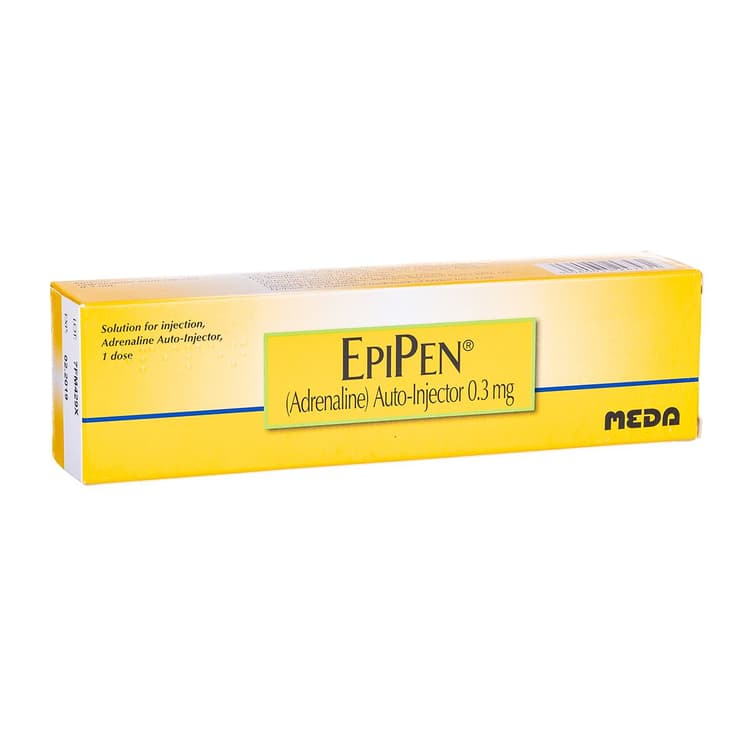Recharge your cells from within and enjoy 20% OFF NAD+ for a limited time only - shop now
EpiPen

Images for illustrative purposes only
Start Your Expert Consultation
EpiPen is an injectable treatment for severe allergic reactions or anaphylaxis. It contains adrenaline, which is designed to be administered only in an emergency situation.
- For use in emergencies
- Acts quickly to treat allergic reactions
- Easy to administer
- Genuine medication
- All drugs sourced in the UK
More information
A Doctor's Overview
 | GP and surgeon, Dr Shane Charles (MBBS, MRCS, PgDip SEM) provides a simple explanation of the medication below: 'EpiPen contains epinephrine and is used to treat severe, life-threatening allergic reactions. '. If you think this is a treatment that can help you, start an online consultation now for a registered prescriber to review. If treatment is deemed suitable, they can prescribe it, and we can deliver it to you from the comfort of your own home with a range of convenient delivery and payment options for you to choose from. If you have any questions about a medication, you should always consult your doctor with any questions prior to starting treatment, to ensure that it is safe and suitable for you. |
How do I buy Epipen online?
Buy EpiPen UK
You can safely buy an EpiPen online in the UK from UK Meds.
Before ordering, you’ll need to complete a quick online consultation with a registered independent prescriber. This ensures that an EpiPen is the right treatment for your condition and can be supplied safely.
Once approved, your order will be processed, and the EpiPen will be delivered to your door.
EpiPen - Key Information
What is the EpiPen?
An EpiPen is a device used to treat severe allergic reactions (anaphylaxis). It contains a dose of adrenaline (epinephrine), which helps quickly relieve dangerous allergy symptoms in emergencies. Each EpiPen delivers 0.3mg of adrenaline.
How does an Epipen work?
The EpiPen works by injecting adrenaline into the body. Adrenaline:
- Opens airways to improve breathing.
- Tightens blood vessels, which raises low blood pressure.
- Reduces swelling in the face, lips, and throat.
- Helps reverse symptoms like wheezing, hives, and severe itching.
It is used to treat allergic reactions caused by:
- Foods (like nuts or shellfish).
- Insect bites or stings.
- Certain medicines.
- Exercise-induced allergies.
What are the benefits of using an EpiPen?
- Fast-acting relief: EpiPens work quickly to stop life-threatening symptoms.
- Improves breathing: Clears airways and reduces wheezing.
- Prevents shock: Raises dangerously low blood pressure.
- Reduces swelling: Helps with hives, throat tightness, and facial swelling.
Remember:
- The effects of an EpiPen only last 10-20 minutes. You must still seek emergency medical help immediately after using it.
- The EpiPen acts as a lifesaving first line of defence, buying you time until professional treatment is provided.
If you or someone you know has severe allergies, carrying an EpiPen can help prevent life-threatening situations. Always follow your doctor’s advice for its proper use.
What do EpiPen users have to say?
EpiPen Reviews
Read first hand what other EpiPen users have to say about the medication. There are a large selection of EpiPen reviews describing what people think about their experiences with the medication available at Drugs.com and Web MD.
It is important to note that people may have different experiences when they use an EpiPen. If someone states that their medication did not work as they had hoped, it does not mean that it will not work for you. If you believe that it is the right medication for you then the best thing to do is to consult your doctor or healthcare professional, and judge the medication based on your own experiences if they recommend it as a treatment. Before starting a medication you should always consult with your healthcare provider first to ensure that it is safe and suitable for your individual needs.
Patient Information Leaflet
For more information on the prescription medication patients should refer to the EpiPen patient information leaflet.
Usage Advice
How do I use an Epipen?
An EpiPen is a lifesaving injection used to treat severe allergic reactions (anaphylaxis). Follow these steps to use it safely and effectively:
Before Using an EpiPen
Before being prescribed an EpiPen, tell your doctor if you have:
- Heart conditions (like high blood pressure, rhythm problems, or coronary artery disease).
- Diabetes, Parkinson’s disease, or thyroid/adrenal gland disorders.
- Any allergies or if you’re pregnant or planning to be.
Step-by-Step Guide to Use an EpiPen
Hold the EpiPen Properly
- Make a fist around the EpiPen with the black tip pointing down.
- Remove the safety cap. Do not put your thumb over the black tip.
Inject into the Thigh
- Place the black tip firmly against the outer thigh (it can go through clothing).
- Push firmly until you hear a click – this activates the injection.
- Hold in place for 3-5 seconds.
Remove and Secure
- Pull the EpiPen out and massage the injection site for a few seconds.
- Insert the used pen needle-first into its carrying tube, re-cap it, and take it to the emergency room.
Remember:
- Emergency Help: Always seek emergency medical attention after using an EpiPen, as the effects wear off after 10-20 minutes.
- Single Use Only: EpiPens can only be used once. Dispose of the used pen in a puncture-proof container away from children and pets.
- Check Your EpiPen:
- Do not use it if the liquid has changed colour or has particles.
- Replace it if it’s expired.
Trainer Pen for Practice
EpiPens often come with a trainer pen (no needle or medicine) for practice. Use this to get comfortable with the injection process so you’re prepared during an emergency.
By following these steps and consulting your doctor, you’ll know exactly how to use an EpiPen in a life-threatening situation.
Dosage
What is the recommended dosage?
The correct EpiPen dosage depends on your body weight.
- EpiPen 0.3 mg: For patients who weigh 30 kg or more.
- EpiPen Jr 0.15 mg: For patients who weigh between 15 kg and 30 kg.
Always follow your doctor’s advice to ensure the correct dosage for your situation. If you’re unsure, speak to your healthcare provider for guidance.
Side Effects
What side effects can an EpiPen have?
An EpiPen is a lifesaving treatment for severe allergic reactions, but it can cause some side effects. Always speak to your doctor if you notice any unusual symptoms, especially after your first injection.
Common Side Effects
You might experience:
- A fast or pounding heartbeat.
- Feeling dizzy or having a throbbing headache.
- Nausea, vomiting, or sweating.
- Weakness, tremors, or feeling nervous and anxious.
- Pale skin.
When to Call a Doctor
Contact your doctor immediately if you notice:
- Breathing problems after using the EpiPen.
- Signs of infection at the injection site, such as pain, swelling, redness, or warmth.
- Dangerously high blood pressure or worsening symptoms.
A pharmacist's overview of the side effects of this medication and how to manage them:
 | Senior Specialist Pharmacist, Dania Al-Zarrad, provides a simple explanation of the common side effects of the medication and how you can manage them: Can cause palpitations, anxiety and tremor, with rare arrhythmias; use only for anaphylaxis and seek immediate care after use. Monitor blood pressure and ecg. |
Warnings & Precautions
Medicine Interactions
Let your doctor know about all medicines you’re taking, including:
- Diuretics (water pills) and beta-blockers.
- Heart rhythm medications (like digoxin).
- Antidepressants or MAO inhibitors.
- Thyroid medications (levothyroxine).
- Cold or allergy medicines containing antihistamines.
- Ergot-based medicines.
Other prescription, over-the-counter drugs, vitamins, or herbal products could interact with an EpiPen, so always check with your healthcare provider.
If you experience severe side effects or are unsure about anything, seek medical help straight away.
Sources:
Learn more with UK Meds support resources for EpiPens:
Here to help you
Our Customer Service is available Monday to Friday 9am - 5pm. If you need urgent assistance, do not use this service. Call 111, or in an emergency call 999. Visit our help section


